

Reading List. Obviously I’d be a fool not to recommend my own books, The Perfect English Lesson and the new one, The Secret of Literacy: making the implicit explicit, but these are some of the works which have inspired me to become a better teacher: Philip Adey & Justin Dillon (ed) Bad Education – Debunking myths in education Geoff Barton Don’t Call it Literacy Phil Beadle Dancing About Architecture & How To Teach.
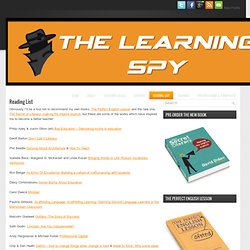
Welcome to the Mnemosyne Project. Anki - friendly, intelligent flashcards. Learning by Spaced Repetition - Life in the Fast Lane medical education blog. Learning by Spaced Repetition - Life in the Fast Lane medical education blog. What is TPACK? Abstract This paper describes a framework for teacher knowledge for technology integration called technological pedagogical content knowledge (originally TPCK, now known as TPACK, or technology, pedagogy, and content knowledge).
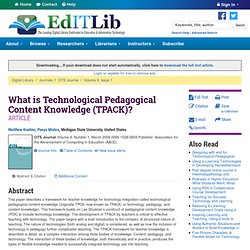
This framework builds on Lee Shulman’s construct of pedagogical content knowledge (PCK) to include technology knowledge. The development of TPACK by teachers is critical to effective teaching with technology. The paper begins with a brief introduction to the complex, ill-structured nature of teaching. How Important is Grit in Student Achievement?
Culture Teaching Strategies.
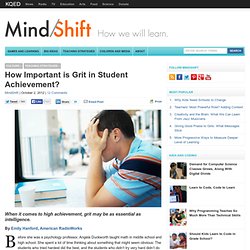
Cognitive Milestones Ages 5 to 8. Mind in the Making: The Seven Essential Life Skills Every Child Needs: Ellen Galinsky: 9780061732324: Amazon.com. Self-Regulation: The Key to Successful Students? New research suggests that children who learn to mind their P’s and Q’s may also have an easier time learning their ABC’s and 123’s.
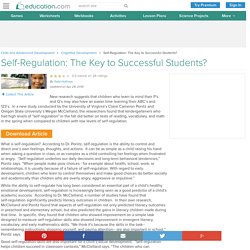
In a new study conducted by the University of Virginia’s Claire Cameron Ponitz and Oregon State University’s Megan McClelland, the researchers found that kindergarteners who had high levels of "self-regulation" in the fall did better on tests of reading, vocabulary, and math in the spring when compared to children with low levels of self-regulation.
What is self-regulation? According to Dr. Ponitz, self-regulation is the ability to control and direct one’s own feelings, thoughts, and actions. Self-Regulated Learning in the Classroom: A Literature Review on the Teacher’s Role. The 21st Century Learner. Noam Chomsky – The Purpose of Education. Skip to content Talks Noam Chomsky – The Purpose of Education 1 Comment Noam Chomsky February 1, 2012 This entry was posted in Featured Talk , Talks .
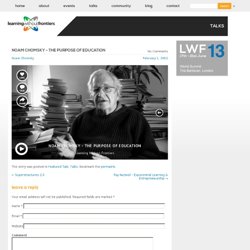
The 7 Most Powerful Ideas In Learning Available Right Now. Tomorrow’s Learning Today: 7 Shifts To Create A Classroom Of The Future by Terry Heick.
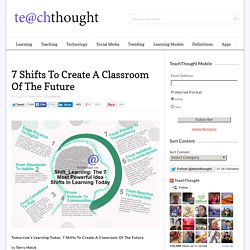
Born to Learn ~ You are Born to Learn. Are badges an alternative for grading? When I share with others that I abolished grading from my classroom years ago, I often get two reactions.
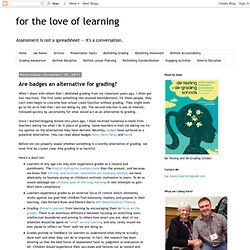
The first looks something like stunned bewilderment; for these people, they can't even begin to conceive how school could function without grading. They might even go so far as to feel that I am not doing my job. Badges 101 Webinar Follow-up. Last Thursday I presented on a Badges 101 webinar run by HASTAC.
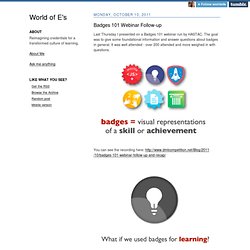
The goal was to give some foundational information and answer questions about badges in general.
How your brain likes to be treated at revision time. If you're a student, you rely on one brain function above all others: memory.
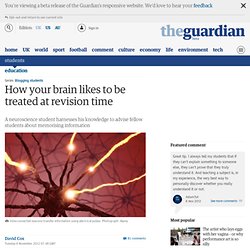
Attention Alert: A Study on Distraction Reveals Some Surprises. Recently my research team observed nearly 300 middle school, high school and university students studying something important for a mere 15 minutes in their natural environments.
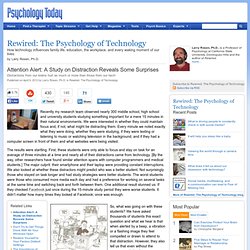
We were interested in whether they could maintain focus and, if not, what might be distracting them. Every minute we noted exactly what they were doing, whether they were studying, if they were texting or listening to music or watching television in the background, and if they had a computer screen in front of them and what websites were being visited. The results were startling. Learning To Ask The Right Question. Learners Should Be Developing Their Own Essential Questions. Having essential questions drive curriculum and learning has become core to many educators’ instructional practices.
Grant Wiggins, in his work on Understanding By Design, describes an essential question as: A meaning of “essential” involves important questions that recur throughout one’s life. MindShift. MindShift explores the future of learning in all its dimensions. We examine how learning is being impacted by technology, discoveries about how the brain works, poverty and inequities, social and emotional practices, assessments, digital games, design thinking and music, among many other topics. We look at how learning is evolving in the classroom and beyond.We also revisit old ideas that have come full circle in the era of the over scheduled child, such as unschooling, tinkering, playing in the woods, mindfulness, inquiry-based learning and student motivation.
We report on shifts in how educators practice their craft as they apply innovative ideas to help students learn, while meeting the rigorous demands of their standards and curriculum. Lets talk about Pedagogy - talkpedagogy_tcm4-193218.pdf. Innovating_Pedagogy_report_July_2012.pdf.
Research. Research engagement. Ocean Pearls. Math pedagogy. Using Blooms Taxonomy Lesson Plans Reviewed by Teachers. Why Select Other Criteria? Sometimes you only have 45 minutes to review participles before Tuesday's assembly, or you need curriculum you know was reviewed after a certain date. Duration: If curriculum authors indicate how long it takes to implement a resource, i.e. a 30-minute vocabulary exercise, a three-day science experiment, or a two-week expository writing project, we note it for you. A world of ideas. School collaboration. Pedagogy. Pedagogy (/ˈpɛdəɡɒdʒi/, /ˈpɛdəɡoʊdʒi/, or /ˈpɛdəɡɒɡi/[1][2]) is the discipline that deals with the theory and practice of education; or the study and practice of 'how best to teach'. Its aims range from the general (full development of the human being via liberal education) to the narrower specifics of vocational education (the imparting and acquisition of specific skills).
For example, Paulo Freire referred to his method of teaching people as "critical pedagogy". In correlation with those instructive strategies, the instructor's own philosophical beliefs of instruction are harbored and governed by the pupil's background knowledge and experience, situation, and environment, as well as learning goals set by the student and teacher. One example would be the Socratic schools of thought.[3][4][5] The teaching of adults, however, may be referred to as andragogy.
Etymology[edit] Academic degrees[edit] An academic degree, Ped. Pedagogues[edit] What is pedagogy? What is pedagogy? Many discussions of pedagogy make the mistake of seeing it as primarily being about teaching. In this piece Mark K. Smith explores the origins of pedagogy and the often overlooked traditions of thinking and practice associated with it. He argues that a focus on teaching as a specialist role is best understood in other ways. Pedagogy needs to be explored through the thinking and practice of those educators who look to accompany learners; care for and about them; and bring learning into life. Contents: introduction · the nature of education · pedagogues and teachers · the growing focus on teaching · the re-emergence of pedagogy · pedagogy as accompanying, caring for and bringing learning to life · conclusion · further reading and references · acknowledgements · how to cite this piece.